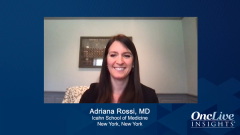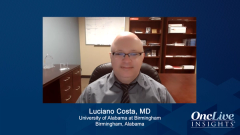
Relapsed/Refractory Multiple Myeloma: Future Directions in Care
Closing out their discussion on bispecifics in multiple myeloma, expert hematologist-oncologists share practical advice for community physicians alongside their hopes for the future.
Episodes in this series

Transcript:
Luciano Costa, MD: For the broader audience, for colleagues who treat myeloma but unlike Dr Rossi and myself, don’t spend their whole life treating myeloma, I think we all have to be knowledgeable about these innovations. CAR [chimeric antigen receptor] T-cell therapy, for the foreseeable future, is going to remain in the setting of a cellular therapy program, but the bispecific antibody therapy is much more likely to arrive at any oncology office in the very near future. Very much like we had with monoclonal antibodies, there may be a bit of a learning curve to get over those first couple of weeks and the risk of CRS [cytokine release syndrome], but beyond that point, it’s likely to be embraced and utilized much like any other myeloma agent.
Adriana Rossi, MD: As you were saying, the CRS seems to be contained to those early days, so it may be that we’ll have a hybrid system, where maybe centers that have more experience can get the first cycle through, as all of us become more comfortable and better at mitigating and understanding the toxicity. I do think and hope that our community partners will be welcoming and excited by this as well. Just as whenever you’re starting any new therapy, it’s important for the patients, the doctors, and the rest of their team to know what to expect. The experience we’ve had, especially with the taste alterations or the nails, can be very off-putting if you don’t know they’re coming. However, if their expectations are set and the supportive care is put in place, these can all be handled quite nicely and make it a much more tolerable and acceptable therapy earlier.
Luciano Costa, MD: Dr Rossi, I think we are clearly in the midst of an immunotherapy revolution in myeloma, and the next few years are going to be exciting for us and promising for our patients. We discussed quite a bit about bispecific antibodies today. We briefly mentioned the innovations coming with CAR T-cell therapy, with new products that may have a longer durability and hopefully yield longer-lasting responses. We should not forget the CELMoDs [cereblon E3 ligase modulators], which are oral agents like evolutions of the…agents that are showing great activity in patients with highly refractory disease and great combinability. We’re likely going to see a mixture of all of those in the next few years.
Thank you for this rich and very informative discussion. Before we conclude, I’d like to get some final thoughts from you, Dr Rossi, about the unmet needs and the future perspective in myeloma.
Adriana Rossi, MD: Absolutely. I’m sure we will continue to push the boundaries. Every time we say these are the patients who need attention, the field steps up and develops new treatments. Regarding the whole concept of immune modulation, I think we’re in the early days. I’m thrilled to have approved therapies, but I recognize these are fairly rudimentary, and I think we have a lot of room to grow in the toxicity, the efficacy, the ease, and the cost. There’s always room for improvement, so we are in the early days of a really exciting new time in myeloma therapy.
Luciano Costa, MD: Thank you again, Dr Rossi, for this very insightful discussion. To our viewing audience, thank you for joining us. We hope you found this OncLive® My Treatment Approach program to be useful and valuable to the management of your patients with multiple myeloma.
Transcript edited for clarity.








































